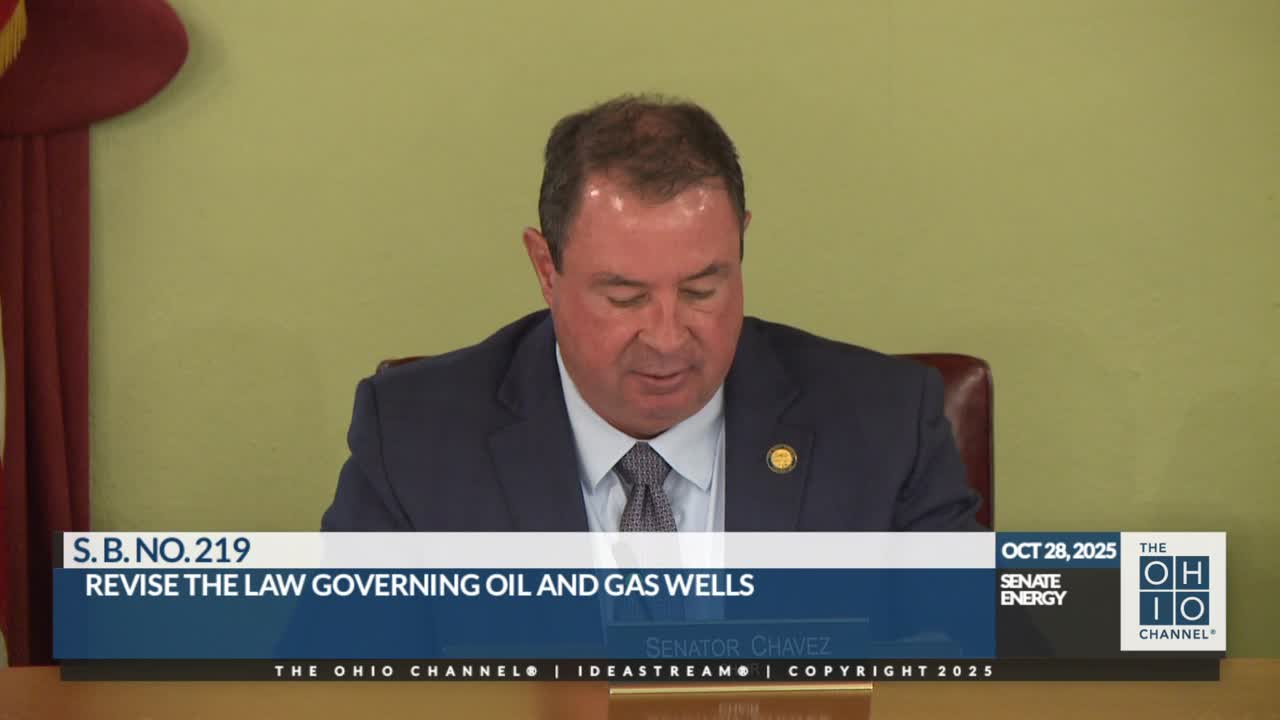Chamber backs oil and gas permitting reforms; opponent warns orphan-well language could shift liabilities
Get AI-powered insights, summaries, and transcripts
Subscribe
Summary
Proponent testimony from the Ohio Chamber emphasized permitting and orphan-well reforms in Senate Bill 219; an opponent said the bill’s revised language removes a dedicated abandoned-well fund and could leave landowners and townships exposed while benefiting larger operators.
Tony Long, general counsel and director of energy and environmental policy for the Ohio Chamber of Commerce, provided proponent testimony on Senate Bill 219, saying the legislation could reform oil and gas exploration, gathering and orphan-well processes to reflect modern horizontal drilling techniques and speed permitting.
Long told the committee SB 219 could address delays in leasing and permitting for state lands, update protections related to horizontal drilling, and create shorter review periods similar to earlier electricity permitting reforms. He said the bill could help the industry bring product to market and enable faster plugging of orphan wells, and he urged the committee to consider additional provisions—such as dedicated funding and shorter review timelines—to accelerate remediation.
In opponent testimony, Kat Finneran of Findlay said she represents residents in a county with a high density of abandoned wells and opposed the bill as it stood in committee. Finneran said a previously lauded abandoned-well fund appeared to have been removed in a substitute and warned the remaining language could enable a transfer of liabilities to shell companies and leave landowners without recourse. "This bill leaves property owners with exposure, not empowerment," she said, and argued the bill would "give the state more power, the industry less responsibility, and communities no protection."
Finneran raised several specific concerns: that townships and municipalities could lose tools such as road-use maintenance agreements used to negotiate safety buffers; that raising bonding and insurance thresholds without a dedicated cleanup fund would disadvantage small Ohio operators while leaving large producers largely unaffected; and that the state lacks adequate inspection and remediation capacity. She also cited a recent worker fatality while plugging a well in Washington County to underscore her safety concerns.
Long and other proponents framed SB 219 as an opportunity to modernize rules, leases and timelines, citing delays that followed the development of horizontal drilling and the discovery of large oil and gas plays under Ohio (testimony named the Utica Shale). Long suggested SB 219 could include automatic awards if an agency misses statutory timelines and could add oil and gas exploration to other sectors benefiting from permitting reforms.
Why it matters: The bill touches on well plugging, leasing of state lands, permitting timelines and potential financial mechanisms for orphan well remediation. Opponents said the version in committee lacks a dedicated remediation fund and could transfer cleanup burdens away from the industry.
The committee did not accept or reject a substitute during the hearing; Long and Finneran provided opposing testimony and the committee concluded the hearing with written testimony available on members' iPads.
